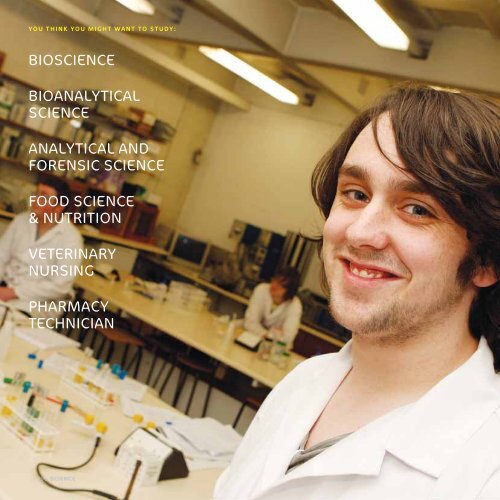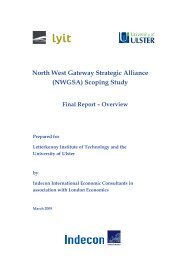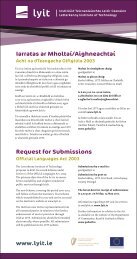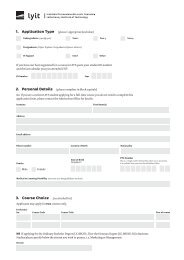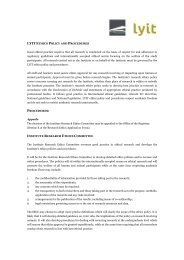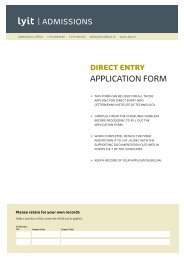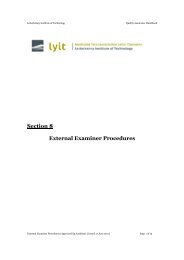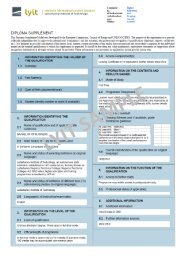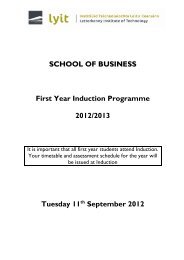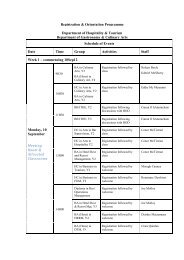BiosCienCe BioanaLYtiCaL sCienCe anaLYtiCaL anD ForensiC ...
BiosCienCe BioanaLYtiCaL sCienCe anaLYtiCaL anD ForensiC ...
BiosCienCe BioanaLYtiCaL sCienCe anaLYtiCaL anD ForensiC ...
You also want an ePaper? Increase the reach of your titles
YUMPU automatically turns print PDFs into web optimized ePapers that Google loves.
YOU THINK YOU MIGHT WANT TO STUDY:<br />
BIOSCIENCE<br />
BIOANALYTICAL<br />
SCIENCE<br />
ANALYTICAL AND<br />
FORENSIC SCIENCE<br />
FOOD SCIENCE<br />
& NUTRITION<br />
VETERINARY<br />
NURSING<br />
PHARMACY<br />
TECHNICIAN<br />
196 SCIENCE
Course LISTING<br />
Bachelor of Science in Bioscience<br />
Bachelor of Science Honours in<br />
Bioanalytical Science<br />
Bachelor of Science in Analytical<br />
and Forensic Science<br />
Bachelor of Science in Honours in<br />
Analytical and Forensic Science<br />
Bachelor of Science in Food<br />
Science and Nutrition<br />
Bachelor of Science Honours in<br />
Food Science and Nutrition<br />
Bachelor of Science<br />
in Veterinary Nursing<br />
Higher Certificate in Science<br />
(Pharmacy Technician)<br />
DEPARTMENT OF<br />
Science<br />
Head of Department<br />
Dr Anne Nelson<br />
Telephone<br />
074 918 6302<br />
Email<br />
anne.nelson@<br />
lyit.ie<br />
Department<br />
Administration<br />
Telephone<br />
074 918 6310<br />
074 918 6306<br />
074 918 6308<br />
This exciting area explores all aspects of how living<br />
things share this planet and interact with each<br />
other. This ranges from investigating DNA fibres to<br />
exploring food, plants, animals and the environment.<br />
Due to the national shortage of science graduates,<br />
there are excellent career opportunities in this area<br />
– with salaries to match.<br />
197
BIOSCIENCE<br />
course title<br />
Bachelor of Science in<br />
Bioscience<br />
national framework level<br />
7<br />
cao code<br />
ly817<br />
duration<br />
3 years<br />
number of places<br />
26<br />
awarding body<br />
lyit<br />
points in recent years<br />
year final median<br />
2008/09 110 285<br />
2009/10 aqa 285<br />
2010/11 220 340<br />
Is this the course for you<br />
Are you curious about how all living<br />
things share this planet How do our<br />
bodies work and what do we need<br />
to survive How do different plants<br />
and species live with each other And<br />
what effect does all this have on our<br />
environment Just think about what<br />
some of these questions can lead to –<br />
improving the diagnosis and treatment<br />
of diseases; developing new drugs;<br />
providing the best care for different<br />
animals and habitats; and protecting the<br />
environment from pollution.<br />
If you are interested in exploring<br />
these areas of life, then this degree can<br />
give you the knowledge and practical<br />
laboratory skills you need to transform<br />
your interest into a fascinating and<br />
rewarding career.<br />
Minimum entry requirements<br />
Pass (od3 or better) in 5 Leaving<br />
Certificate subjects, including passes<br />
in Mathematics and in either Irish or<br />
English (or an equivalent qualification).<br />
The minimum points for entry is<br />
140 points.<br />
Career opportunities<br />
This exciting and growing area plays<br />
a vital role in medicine, pharmacy,<br />
agriculture, the food industry and<br />
environmental analysis. Graduates have<br />
a great choice of careers at home and<br />
abroad with high demand resulting in<br />
high salaries.<br />
1 Analytical scientists – working for<br />
biopharmaceutical companies in<br />
teams with other scientists<br />
1 Research assistants – investigating<br />
theories, materials and processes<br />
in universities, the Health Service<br />
Executive and pharmaceutical<br />
companies<br />
1 Product development officers – using<br />
new research to develop new products<br />
for pharmaceutical companies.<br />
1 Quality assurance and quality control<br />
analysts – testing and monitoring<br />
products<br />
1 Customer service / medical sales<br />
representatives – using your specialist<br />
knowledge to assist existing customers<br />
or sell end-products to hospitals,<br />
clinics, pharmacies etc.<br />
1 Environmental scientists – working in<br />
County Councils, private companies or<br />
the Environmental Protection Agency.<br />
Larger employers include: Allergen,<br />
Wyeth BioPharma, Abbott Ireland,<br />
Schering Plough, Genzyme Megazyme,<br />
Merck Sharpe and Dohme, Takeda and<br />
Pfizer. Visit www.science.ie, www.aibs.<br />
org and www.biotechnologyireland.com<br />
for more career ideas.<br />
Follow-on courses<br />
1 B.Sc. Honours in Bioanalytical Science<br />
at LYIT which has been formally<br />
approved by the Teachers Council<br />
of Ireland<br />
1 Honours degrees at other colleges<br />
or universities.<br />
198
DEPARTMENT OF SCIENCE<br />
What will I study<br />
Year/<br />
Semester<br />
Proposed<br />
Modules<br />
Mandatory<br />
/Elective<br />
Class<br />
hours<br />
per week<br />
No. of<br />
credits<br />
1|1<br />
1|2<br />
2|3<br />
2|4<br />
3|5<br />
3|6<br />
Cell Biology M 5 5<br />
Chemistry 1 M 5 5<br />
Physics 1 M 4 5<br />
Learning & Communication<br />
Skills for Scientists M 3 5<br />
Laboratory Safety & Health M 3 5<br />
Mathematical Skills for Science 1 M 4 5<br />
Animal & Plant Biology M 5 5<br />
Chemistry 2: Fuels, Organic<br />
Chemistry & Biochemistry M 5 5<br />
Information Technology for Science 1 M 3 5<br />
Exploring Science M 3 5<br />
Calculus Skills for Science M 4 5<br />
Physics 2 M 5 5<br />
Biochemistry M 4 5<br />
Information Technology for Science 2 M 2 5<br />
Ecosystems M 5 5<br />
Instrumental Analysis 1:<br />
Spectrometry & Electroanalysis M 5 5<br />
Mathematical Methods For Science 1 M 3 5<br />
Microbiology 1 M 4 5<br />
Nucleic Acids M 3 5<br />
Water Analysis M 4 5<br />
Anatomy & Physiology M 3 5<br />
Instrumental Analysis 2: Chromatography M 5 5<br />
Mathematical Methods for Science 2 M 3 5<br />
Microbiology 2 M 4 5<br />
Mammalian Cell & Tissue Culture M 4 5<br />
Protein Chemistry M 4 5<br />
Chromatographic &<br />
Electrophoretic Techniques M 4 5<br />
Research Skills M 2 5<br />
Spectrometric Methods M 5 5<br />
Statistics M 3 5<br />
DNA Technology M 4 5<br />
Environmental Analysis M 4 5<br />
Immunoassays M 4 5<br />
Industrial & Clean Room Microbiology M 4 5<br />
Scientific Literature Project M 2 5<br />
Quality Assurance M 3 5<br />
199
Bioanalytical Science<br />
course title<br />
Bachelor of Science Honours<br />
in Bioanalytical Science<br />
national framework level<br />
8<br />
lyit internal code<br />
ly_sbioa_b<br />
duration<br />
1 year<br />
number of places<br />
16<br />
awarding body<br />
lyit<br />
Is this the course for you<br />
This course gives graduates of the<br />
B.Sc. in Bioscience a chance to explore<br />
specialist areas in more depth. As one of<br />
these graduates, you will have a passion<br />
and enthusiasm for the living world<br />
around us. You are eager to expand your<br />
knowledge and enhance your practical<br />
skills and techniques learned in the<br />
last three years – skills that will make<br />
you even more highly sought after by<br />
industry. If you enjoyed learning about<br />
how living organisms function and<br />
interact in our world, and you wish to<br />
carve out an expertise, then this course<br />
is for you.<br />
Minimum entry requirements<br />
Level 7 B.Sc. in Bioscience or equivalent<br />
qualifications.<br />
Career opportunities<br />
The deeper knowledge and stronger<br />
practical laboratory skills gained from<br />
this degree will give you a distinct<br />
advantage in the job market over<br />
graduates from Level 7 courses. You will<br />
be ready to take on positions with greater<br />
responsibility or specialist knowledge. In<br />
addition to the careers listed for Level 7<br />
graduates, there is strong demand for:<br />
1 Bioanalysts in molecular biology,<br />
microbiology, immunology and<br />
pharmaceuticals working in research<br />
departments of companies and<br />
state organisations<br />
1 Innovation and product development<br />
officers with biotechnology,<br />
pharmaceutical, food or health<br />
care companies<br />
1 Secondary school science teacher<br />
– this degree is formally approved<br />
by the Teacher’s Council, so as a<br />
graduate, you can proceed directly<br />
to do your H.Dip.<br />
200
DEPARTMENT OF SCIENCE<br />
Larger employers include:<br />
Allergen, Wyeth BioPharma,<br />
Abbott Ireland, Schering Plough,<br />
Genzyme Megazyme, Merck Sharpe<br />
and Dohme, Takeda and Pfizer. Visit<br />
www.science.ie, www.aibs.org and<br />
www.biotechnologyireland.com for<br />
more career ideas.<br />
Follow-on courses<br />
1 Postgraduate study by research<br />
at LYIT<br />
1 Masters degrees in other colleges<br />
or universities.<br />
What will I study<br />
Year/<br />
Semester<br />
1|1<br />
1|2<br />
Proposed<br />
Modules<br />
Mandatory<br />
/Elective<br />
Class<br />
hours<br />
per week<br />
No. of<br />
credits<br />
Applied Practical Analysis M 4 5<br />
Analytical Science M 5 5<br />
Research Project Design M 2 5<br />
Regulation of the Pharmaceutical<br />
& Food Industries M 3 5<br />
Toxicology M 3 5<br />
Data Analysis M 3 5<br />
Molecular Diagnostics M 3 5<br />
Bioanalytical Techniques M 5 5<br />
Research Project M 2 10<br />
Industrial Processes &<br />
the Biopharmaceutical Industry M 3 5<br />
Advanced Immunology M 3 5<br />
201
ANALYTICAL AND FORENSIC SCIENCE<br />
course title<br />
Bachelor of Science in<br />
Analytical and Forensic<br />
Science<br />
national framework level<br />
7<br />
cao code<br />
ly827<br />
duration<br />
3 years<br />
number of places<br />
26<br />
awarding body<br />
lyit<br />
points in recent years<br />
year final median<br />
2008/09 aqa 330<br />
2009/10 aqa 275<br />
2010/11 200 305<br />
Is this the course for you<br />
This course brings science to life – it<br />
helps us to use materials to tell a story.<br />
This science may identify a material<br />
causing environmental pollution, it<br />
can show how pure a drug is, it can<br />
even provide forensic evidence used in<br />
criminal court cases. Modern forensic<br />
investigations need analytical scientists<br />
to help tell the story of what happened,<br />
what caused an event or what will<br />
happen if certain steps are taken. If you<br />
want to learn about how such facts are<br />
discovered, how samples are collected,<br />
analysed and guarded and how the legal<br />
framework is involved, then this course<br />
is for you.<br />
Minimum entry requirements<br />
Pass (od3 or better) in 5 Leaving<br />
Certificate subjects, including passes<br />
in Mathematics and in either Irish or<br />
English (or an equivalent qualification).<br />
The minimum points for entry is<br />
140 points.<br />
Career opportunities<br />
There is a strong demand for science<br />
graduates with skills in scientific<br />
analysis, especially for those with the<br />
level of practical experience gained at<br />
LYIT. There are many different roles:<br />
1 Environmental, medical, chemical,<br />
pharmaceutical and health care<br />
industries – working in analysis,<br />
quality assurance, research and<br />
innovation/product development.<br />
1 Industrial and governmental<br />
laboratories – identifying materials<br />
causing environmental pollution;<br />
purifying drugs; acquiring forensic<br />
evidence for criminal court cases. This<br />
work can range from fibre analysis to<br />
using DNA technology and may also<br />
include serving as an expert witness in<br />
court cases.<br />
1 Environmental scientists – working for<br />
County Councils, private industry or<br />
the Environmental Protection Agency.<br />
Larger employers include:<br />
Loctite, Allergen, Abbott Ireland,<br />
Schering Plough, Merck Sharpe and<br />
Dohme, Takeda and Pfizer.<br />
Please visit www.forensicscience.ie and<br />
www.forensic-science-society.org.uk for<br />
more career ideas.<br />
Follow-on courses:<br />
1 B.Sc Honours in Analytical and<br />
Forensic Science.<br />
202
DEPARTMENT OF SCIENCE<br />
What will I study<br />
Year/<br />
Semester<br />
1|1<br />
1|2<br />
Proposed<br />
Modules<br />
Mandatory<br />
/Elective<br />
Class<br />
hours<br />
per week<br />
No. of<br />
credits<br />
Cell Biology M 5 5<br />
Chemistry 1 M 5 5<br />
Physics 1 M 4 5<br />
Learning & Communication Skills<br />
for Scientists M 3 5<br />
Laboratory Safety & Health M 3 5<br />
Mathematical Skills for Science 1 M 4 5<br />
Animal & Plant Biology M 5 5<br />
Chemistry 2: Fuels, Organic Chemistry<br />
& Biochemistry M 5 5<br />
Physics 2 M 5 5<br />
Calculus Skills for Science M 4 5<br />
Exploring Science M 3 5<br />
Information Technology for Science 1 M 3 5<br />
Year/<br />
Semester<br />
2|3<br />
2|4<br />
3|5<br />
3|6<br />
Proposed<br />
Modules<br />
Mandatory<br />
/Elective<br />
Class<br />
hours<br />
per week<br />
No. of<br />
credits<br />
Biochemistry M 4 5<br />
Microbiology 1 M 4 5<br />
Organic Chemistry 1 M 4 5<br />
Information Technology for Science 2 M 2 5<br />
Instrumental Analysis 1:<br />
Spectrometry & Electroanalysis M 5 5<br />
Mathematical Methods for Science 1 M 3 5<br />
Nucleic Acids M 3 5<br />
Physical & Inorganic Chemistry M 5 5<br />
Mathematical Methods for Science 2 M 3 5<br />
Forensic Analysis of Surfaces M 4 5<br />
Instrumental Analysis 2: Chromatography M 5 5<br />
Organic Chemistry 2 M 4 5<br />
Chromatographic &<br />
Electrophoretic Techniques M 4 5<br />
Spectrometric Methods M 5 5<br />
Pharmacology M 3 5<br />
Research Skills M 2 5<br />
Statistics M 3 5<br />
Forensic Fibre Analysis M 4 5<br />
DNA Technology M 4 5<br />
Quality Assurance M 3 5<br />
Scientific Literature Project M 2 5<br />
The Irish Legal System &<br />
the Criminal Process M 3 5<br />
Forensic Statistics M 3 5<br />
Forensic Analysis M 4 5<br />
203
ANALYTICAL AND FORENSIC SCIENCE<br />
course title<br />
Bachelor of Science Honours<br />
in Analytical and Forensic<br />
Science<br />
national framework level<br />
8<br />
lyit internal code<br />
ly_sansf_b<br />
duration<br />
1 year<br />
number of places<br />
16<br />
awarding body<br />
lyit<br />
Is this the course for you<br />
If you enjoyed studying the B.Sc. in<br />
Analytical and Forensic Science and want<br />
to gain a more in-depth understanding<br />
of this area, then the natural next step<br />
is to complete this one-year add-on<br />
course. It will give you more knowledge<br />
of core areas of forensics, the chemical<br />
and pharmaceutical industries, forensic<br />
toxicology and medicinal chemistry.<br />
You will also have stronger practical<br />
experience working in the laboratories<br />
and research using the latest techniques<br />
and technology.<br />
Minimum entry requirements<br />
Level 7 B.Sc. in Analytical and Forensic<br />
Science or equivalent qualification.<br />
Career opportunities<br />
There is a shortage of graduates with<br />
strong analytical science skills so<br />
career opportunities for positions with<br />
increased responsibilities are excellent.<br />
The deeper knowledge and stronger<br />
practical laboratory skills gained from<br />
this degree will mean you are ready<br />
for more senior roles than Level 7<br />
graduates in areas such as:<br />
1 Environmental, medical, chemical,<br />
pharmaceutical and health care<br />
industries – working in analysis,<br />
quality assurance, research and<br />
innovation/product development<br />
1 Industrial and governmental<br />
laboratories – identifying materials<br />
causing environmental pollution;<br />
purifying drugs; acquiring forensic<br />
evidence for criminal court cases. This<br />
work can range from fibre analysis to<br />
using DNA technology and may also<br />
include serving as an expert witness in<br />
court cases<br />
1 Environmental scientists – working for<br />
County Councils, private industry or<br />
the Environmental Protection Agency.<br />
Larger employers include<br />
Loctite, Allergen, Wyeth, Genzyme<br />
Megazyme, Abbott Ireland, Schering<br />
Plough, Merck Sharpe and Dohme,<br />
Takeda and Pfizer. Please visit<br />
www.forensicscience.ie and www.<br />
forensic-science-society.org.uk for more<br />
career ideas.<br />
Follow-on courses<br />
1 Postgraduate studies by research<br />
at LYIT<br />
1 Masters level studies at other colleges<br />
or universities.<br />
204
DEPARTMENT OF SCIENCE<br />
What will I study<br />
Year/<br />
Semester<br />
Proposed<br />
Modules<br />
Mandatory<br />
/Elective<br />
Class<br />
hours<br />
per week<br />
No. of<br />
credits<br />
1|1<br />
1|2<br />
Applied Practical Analysis M 4 5<br />
Analytical Science M 5 5<br />
Research Project Design M 2 5<br />
Toxicology M 3 5<br />
Data Analysis M 3 5<br />
Medicinal Chemistry M 3 5<br />
Photochemistry & Forensic Analysis M 3 5<br />
Forensic Toxicology M 3 5<br />
Research Project M 2 10<br />
Novel Materials M 3 5<br />
Forensic Science & the Laws of Evidence M 3 5<br />
205
FOOD SCIENCE AND NUTRITION<br />
course title<br />
Bachelor of Science in Food<br />
Science and Nutrition<br />
national framework level<br />
7<br />
cao code<br />
ly837<br />
duration<br />
3 years<br />
number of places<br />
26<br />
awarding body<br />
lyit<br />
points in recent years<br />
year final median<br />
2008/09 100 315<br />
2009/10 115 325<br />
2010/11 200 325<br />
Is this the course for you<br />
Food science and nutrition is something<br />
we all take part in everyday – it’s about<br />
what we eat, how our diets affect our<br />
bodies, the relationship between diet<br />
and disease, how changing consumer<br />
lifestyles impact on our health and how<br />
the food industry operates. This course<br />
is for you if you want to gain a sound<br />
knowledge of science generally and food<br />
and nutrition in particular. It includes a<br />
short placement in industry.<br />
Minimum entry requirements<br />
Pass (od3 or better) in 5 Leaving<br />
Certificate subjects, including passes<br />
in Mathematics and in either Irish or<br />
English (or an equivalent qualification).<br />
The minimum points for entry is<br />
140 points.<br />
Career opportunities<br />
As our largest home-grown industry, the<br />
Food sector has a strong and growing<br />
demand for skilled Food Science and<br />
Nutrition graduates to work in areas<br />
such as:<br />
1 Product development – enhancing<br />
products and creating new products,<br />
working with other departments in<br />
food companies such as marketing<br />
1 Quality control – testing raw materials<br />
and finished products<br />
1 Food company production management<br />
– overseeing all stages of product<br />
manufacture<br />
1 Retail – improving the technical aspects<br />
of store products and acting as in-house<br />
food hygiene inspectors<br />
1 Health promotion – working for<br />
central or local government to promote<br />
healthy diets, food safety and industry<br />
regulation<br />
1 Laboratory research in companies,<br />
universities or government laboratories<br />
– analysing the properties of food<br />
or studying nutrition in health<br />
and disease.<br />
Follow-on courses<br />
1 B.Sc. Honours in Food Science and<br />
Nutrition at LYIT<br />
1 Honours level courses at other colleges<br />
and universities.<br />
206
DEPARTMENT OF SCIENCE<br />
What will I study<br />
Year/<br />
Semester<br />
Proposed<br />
Modules<br />
Mandatory<br />
/Elective<br />
Class<br />
hours<br />
per week<br />
No. of<br />
credits<br />
Year/<br />
Semester<br />
Proposed<br />
Modules<br />
Mandatory<br />
/Elective<br />
Class<br />
hours<br />
per week<br />
No. of<br />
credits<br />
1|1<br />
Cell Biology M 5 5<br />
Chemistry 1 M 5 5<br />
Physics 1 M 4 5<br />
Learning & Communication<br />
Skills for Scientists M 3 5<br />
Laboratory Safety & Health M 3 5<br />
Mathematical Skills for Science 1 M 4 5<br />
3|5<br />
Food Technology 3:<br />
Milk & Meat Technology M 4 5<br />
Food Microbiology 2 M 4 5<br />
Advanced Food Chemistry M 4 5<br />
Industrial Placement M 1 5<br />
Research Skills M 2 5<br />
Statistics M 3 5<br />
1|2<br />
Animal & Plant Biology M 5 5<br />
Chemistry 2: Fuels, Organic<br />
Chemistry & Biochemistry M 5 5<br />
Physics 2 M 5 5<br />
Calculus Skills for Science M 4 5<br />
Exploring Science M 3 5<br />
Information Technology for Science 1 M 3 5<br />
3|6<br />
Food Technology 4: Plant Food Technology M 4 5<br />
Quality Assurance M 3 5<br />
Food Microbiology 3 M 4 5<br />
Scientific Literature Project M 2 5<br />
Health Promotion M 3 5<br />
Human Nutrition M 3 5<br />
2|3<br />
2|4<br />
Biochemistry M 4 5<br />
Microbiology 1 M 4 5<br />
Food Technology 1:<br />
Unit Operations & Plant Hygiene M 4 5<br />
Information Technology for Science 2 M 2 5<br />
Instrumental Analysis 1:<br />
Spectrometry & Electroanalysis M 5 5<br />
Food Chemistry & Nutrition 1 M 4 5<br />
Food Technology 2:<br />
Heat Preservation Operations M 4 5<br />
Food Microbiology 1 M 4 5<br />
Food Chemistry & Nutrition 2 M 4 5<br />
Anatomy & Physiology M 3 5<br />
Instrumental Analysis 2: Chromotography M 5 5<br />
Nucleic Acids M 3 5<br />
207
FOOD SCIENCE AND NUTRITION<br />
course title<br />
Bachelor of Science Honours<br />
in Food Science and Nutrition<br />
national framework level<br />
8<br />
lyit internal code<br />
ly_sfodn_b<br />
duration<br />
1 year<br />
number of places<br />
16<br />
awarding body<br />
lyit<br />
Is this the course for you<br />
If you studied the Level 7 B.Sc. in Food<br />
Science and Nutrition and feel you’d<br />
like to deepen your knowledge and<br />
experience of this area, then this one<br />
year add-on course is what you’re<br />
looking for. You’ll be able to explore<br />
aspects of this vital industry in more<br />
depth, enhance your practical skills<br />
through an extensive research project<br />
and look at broader issues such as<br />
industry regulation and management<br />
structures. This great mix of theory<br />
and practice gives you the strong set<br />
of skills and knowledge increasingly<br />
required by employers.<br />
Minimum entry requirements<br />
Level 7 B.Sc. in Food Science and<br />
Nutrition or equivalent qualification.<br />
Career opportunities<br />
Advances in nutritional knowledge and<br />
food technology make this an exciting<br />
and constantly evolving area to work in,<br />
and one in which there is a consistent<br />
demand for well qualified graduates at<br />
home and abroad. In addition to careers<br />
listed under the Level 7 B.Sc. in Food<br />
Science and Nutrition, there is demand<br />
for graduates in positions of greater<br />
responsibility in the food industry and<br />
in government departments or agencies.<br />
Positions range from microbiologists<br />
and laboratory analysts to business unit<br />
managers in food production, quality<br />
assurance technicians and positions in<br />
product development and food safety.<br />
Follow-on courses<br />
1 Postgraduate studies by research<br />
at LYIT<br />
1 Masters courses in other colleges<br />
and universities<br />
208
DEPARTMENT OF SCIENCE<br />
What will I study<br />
Year/<br />
Semester<br />
Proposed<br />
Modules<br />
Mandatory<br />
/Elective<br />
Class<br />
hours<br />
per week<br />
No. of<br />
credits<br />
1|1<br />
1|2<br />
Food Technology M 4 5<br />
Food Fermentation M 4 5<br />
Research Project Design M 2 5<br />
Regulation of the Pharmaceutical<br />
& Food Industries M 3 5<br />
Management Structures M 3 5<br />
Advanced Human Nutrition M 3 5<br />
Food Product Development M 4 5<br />
Microbiological Food Safety M 4 5<br />
Research Project M 2 10<br />
Nutrition in Health & Disease M 3 5<br />
Sports Nutrition M 3 5<br />
209
VETERINARY NURSING<br />
course title<br />
Bachelor of Science in<br />
Veterinary Nursing<br />
national framework level<br />
7<br />
cao code<br />
ly847<br />
duration<br />
3 years<br />
number of places<br />
20 of which<br />
2 is reserved for FETAC applicants<br />
1 is reserved for Mature applicants<br />
1 is reserved for Foundation Course<br />
awarding body<br />
lyit<br />
Is this the course for you<br />
This course is designed for people<br />
who are eager to care for animals. You<br />
will work closely with the veterinary<br />
surgeon in helping to diagnose and<br />
treat medical and surgical cases. In<br />
addition to learning different aspects<br />
of science, clinical and surgical nursing,<br />
animal husbandry, ethics and laboratory<br />
management, you will also learn about<br />
veterinary practice management and<br />
communication skills.<br />
The strong skills and knowledge you will<br />
receive from this practical course will<br />
leave you well placed for an enjoyable<br />
and challenging career.<br />
Minimum entry requirements<br />
Pass (od3 or better) in 5 Leaving<br />
Certificate subjects, including passes in<br />
Mathematics and in either Irish or English<br />
(or an equivalent qualification). For the<br />
BSc in Veterinary Nursing, one of the five<br />
Leaving Certificate subjects must also<br />
include a laboratory based science subject.<br />
1 Applicants from Northern Ireland must<br />
have a minimum of 1 GCE A level at grade<br />
E or better and 4 other passes at GCSE ‘O’<br />
level grade C or better to include Maths,<br />
English and a science based subject.<br />
or<br />
1 Have obtained a full FETAC Level 5<br />
Certificate in Animal Care (CASAC),<br />
including a distinction in C20006<br />
Biology and two further distinctions in<br />
the following modules,C20152 Animal<br />
Welfare, C20153 Animal Anatomy &<br />
Physiology or G20001 Communications.<br />
points in recent years<br />
year final median<br />
2008/09 185 345<br />
2009/10 330 370<br />
2010/11 350 380<br />
210
DEPARTMENT OF SCIENCE<br />
Career opportunities<br />
As a veterinary nurse you will have a<br />
rewarding and varied career helping<br />
to take care of all kinds of animals in<br />
rural and urban areas. You may work in<br />
zoos, private practices, animal welfare<br />
organisations or pharmaceutical<br />
suppliers to the veterinary industry.<br />
Work in veterinary surgeries will include<br />
giving diagnoses, preparing equipment<br />
and animals for surgery and treatments,<br />
assisting with operations and caring<br />
for hospitalised patients. If working in<br />
a small practice you will also take care<br />
of clerical and receptionist duties such<br />
as filing, keeping records and making<br />
appointments. Visit www.ivna.ie for<br />
more career ideas.<br />
Work Placement: Please note that<br />
with respect to the placement, while<br />
the institute will make every effort to<br />
assist the learner in finding a placement<br />
final responsibility for securing the<br />
placement resides with the learner.<br />
Accreditation: This course received<br />
full accreditation from the Veterinary<br />
Council of Ireland in July 2011.<br />
What will I study<br />
Year/<br />
Semester<br />
1|1<br />
1|2<br />
2|3<br />
2|4<br />
3|5<br />
Proposed<br />
Modules<br />
Mandatory<br />
/Elective<br />
Class<br />
hours<br />
per week<br />
No. of<br />
credits<br />
Introduction to Nursing M 10 5<br />
Communications & Study Skills M 8 5<br />
Laboratory Science & Calculations M 6 5<br />
Animal Husbandry 1 & Welfare M 6 5<br />
Placement Preparation M 1 –<br />
Placement 1 M 6 weeks 10<br />
Biological & Bioveterinary Science M 8 7.5<br />
Veterinary Nursing 1 M 8 7.5<br />
Surgical Nursing 1 M 4 5<br />
Placement Preparation M 1 –<br />
Placement 2 M 6 weeks 10<br />
Communication & Client<br />
Consultation Skills M 8 5<br />
Veterinary Nursing 2 M 12 10<br />
Animal Husbandry 2 & Nutrition M 6 5<br />
Basic Veterinary Practice Management M 6 5<br />
Placement Preparation M 1 –<br />
Placement 3 M 6 weeks 5<br />
Veterinary Nursing 3 M 8 15<br />
Placement Preparation M 1 –<br />
Placement 4 M 6 weeks 15<br />
Veterinary Nursing 4 M 7 10<br />
Surgical Nursing 2 M 4 5<br />
Placement Preparation M 1 –<br />
Placement 5 M 6 weeks 15<br />
3|6<br />
Animal Husbandry 3 M 4 2.5<br />
Veterinary Nursing 5 M 4 5<br />
Research Project M 3 2.5<br />
Professional & Ethical Studies M 4 5<br />
Behaviour & Behavioural Therapy M 4 5<br />
Pharmacy Laboratory & Stock Management M 2 2.5<br />
Advanced Veterinary Practice Management M 4 2.5<br />
Placement 6 M 6 weeks 5<br />
211
PHARMACY TECHNICIAN<br />
course title<br />
Higher Certificate in Science<br />
(Pharmacy Technician)<br />
national framework level<br />
6<br />
cao code<br />
ly806<br />
duration<br />
2 years<br />
number of places<br />
20 of which<br />
1 is reserved for FETAC applicants<br />
2 is reserved for Mature Applicants<br />
1 is reserved for Foundation/Access<br />
awarding body<br />
lyit<br />
points in recent years<br />
year final median<br />
2010/11 105 270<br />
Is this the course for you<br />
This course is a two-year course leading<br />
to the qualification of Higher Certificate<br />
in Science (Pharmacy Technician).<br />
This programme will be delivered over<br />
four semesters allowing learners to gain<br />
their qualification in two ears. The main<br />
aim of the programme is to produce<br />
graduates with the required theoretical<br />
and hands-on skills to allow them to<br />
work in a pharmacy setting and to<br />
contribute effectively to the pharmacy.<br />
The programme involves a placement<br />
element consisting of a two day<br />
placement in each week of each semester<br />
in a pharmacy setting. It is intended<br />
that students will be placed in both<br />
community and hospital pharmacies.<br />
Minimum entry requirements<br />
Application to the course will be via<br />
normal CAO application Processes.<br />
Applicants under the age of 23 must<br />
have obtained at least five passes in<br />
the Leaving Certificate including the<br />
following subjects:<br />
– English or Irish at 0D3 or higher<br />
(not Foundation Level Irish).<br />
– Maths at 0D3 or higher, or Higher Level<br />
at grade E or higher or B2 or higher in<br />
Foundation Maths.<br />
– At least 3 other subjects at 0D3<br />
or higher of which one must be a<br />
laboratory based science subject.<br />
Applicants are welcome from persons<br />
who are over 23 years of age (by 1 January<br />
in the year of entry) who do not hold<br />
a Leaving Certificate and these will<br />
be treated as having applied on the<br />
basis of Maturity as well as any other<br />
qualification that they may possess.<br />
Garda Vetting: Everyone who joins<br />
this course will have to be vetted by<br />
the Gardaí (police). If the Gardaí raise<br />
an issue it will have to be addressed<br />
satisfactorily. If it is not, you will not<br />
be able to go on placement or fulfil<br />
your course requirements, in which<br />
case you may be asked to leave the<br />
course. Please note that all courses<br />
requiring Garda vetting will only have<br />
places for non-EU candidates if there<br />
are not enough qualified EU candidates<br />
available to fill the course.<br />
Work Placement: Please note that<br />
with respect to the placement, while<br />
the institute will make every effort to<br />
assist the learner in finding a placement<br />
final responsibility for securing the<br />
placement resides with the learner.<br />
212
DEPARTMENT OF SCIENCE<br />
Career opportunities<br />
Currently, and for the foreseeable future,<br />
employment prospects for pharmacy<br />
technicians are good as graduates will<br />
find employment in both communitybased<br />
pharmacies and the public and<br />
private hospital sectors. They can<br />
also expect to find employment in the<br />
pharmaceutical industry.<br />
What will I study<br />
Year/<br />
Semester<br />
1|1<br />
Proposed<br />
Modules<br />
Mandatory<br />
/Elective<br />
Class<br />
hours<br />
per week<br />
No. of<br />
credits<br />
Chemistry M 4 5<br />
Biological Science M 4 5<br />
Introduction to Pharmacology M 3 5<br />
Pharmacy Practice 1 M 3 5<br />
Placement 1 M 2 days per week 10<br />
Follow-on courses<br />
At present pharmacy technicians with<br />
a level 6 qualification may apply for<br />
positions within the HSE as pharmacy<br />
technicians. The course may open<br />
opportunities for graduates to apply to<br />
MPharm courses in the UK via UCAS.<br />
1|2<br />
2|3<br />
2|4<br />
Organic and Applied Chemistry M 4 5<br />
Information Technology M 3 5<br />
Pharmacology & Therapeutics M 3 5<br />
Applied Physiology 1 M 3 5<br />
Placement 2 M 2 days per week 10<br />
Drug Action and Usage 1 M 3 5<br />
Pharmacy Practice 2 M 3 5<br />
Pharmaceutical Chemistry M 4 5<br />
Applied Physiology 2 M 3 5<br />
Placement 3 M 2 days per week 10<br />
Drugs Action & Usage 2 M 3 5<br />
Pharmacy Business Management M 3 5<br />
Formulation & Compounding M 3 5<br />
Pharmacy Practice 3 M 3 5<br />
Placement 4 M 2 days per week 10<br />
213


